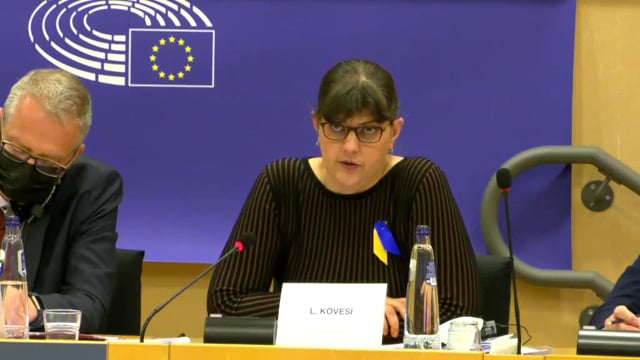[WATCH] Malta investigators pass the buck on EU fraud, top prosecutor complains to MEPs
EU’s financial crime watchdog Laura Codruţa Kövesi has told MEPs that national authorities in Malta are “unable to respond to simple questions”


Malta is only payig lip-service to efforts to crack down on EU fraud and corruption, the head of the EU’s financial crime watchdog Laura Codruţa Kövesi has said.
She told MEPs on Wednesday that national authorities in Malta were “unable to respond to simple questions.”
“We are trying to speak to all member states and explain good practices... but I have to be honest: if member states do not do their job, we are not allowed to do their job. Unfortunately some member states support the EPPO only with words, and not with facts.
“I visited Malta. I had meetings with the national authorities and after two days it was very difficult for me to identify the institution that is responsible for detecting crimes,” she said.
“All of them said that ‘it’s not me. It’s them’. And when I visited them, they said ‘it’s not us’. It’s them,” she said.
Malta has various authorities involved in the fight against fraud, chiefly the Financial Crimes Investigations Department, as well as the Internal Audit and Investigations Department within the Office of the Prime Minister, and the Financial Intelligence Analysis Unit.
Yvonne Farrugia, a former senior police inspector of the Malta Police Force, was appointed by the Council of the European Union as the first European Prosecutor for Malta within the European Public Prosecutor Office in 2020.
Kövesi heads the Luxembourg-based European Public Prosecutor's Office, which is tasked to crack down on VAT fraud and other financial crimes dealing with EU money. Launched in June 2021, with a prosecutor from each EU member state, it has so far seized some €147 million in assets, made arrests, and currently has 515 active investigations totalling an estimated €5.4 billion in damages.
“If you are an organised (crime) group and you know the level of detection in a member state is very low, you would love to operate in that member state... even if an irregularity is detected, there is a low level of risk of being investigated. This sets the scene for corruption, and in turn affects the quality of life of people.
“Can prosecutors detect corruption? No, it is not our job. Our job is to investigate and prosecute. There is the police, the tax administration... it is their job.”
Aside from Ireland, Hungary, Poland and Sweden, every EU state has signed up to the Luxembourg-based office to help fight the crimes. Denmark has a special opt-out.
But Malta is so far the only participating member that has not opened any investigation.
Luxembourg also has only one, posing questions on the quality and drive of national authorities to alert Kövesi’s office of possible crimes. “You cannot find it if you don’t search, especially revenue fraud,” said Kövesi.
This stands in contrast to the 576 total cases opened across all other participating member states, including 120 in Italy alone.
Kövesi will now carry out a a revision of the rules for the EPPO to guarantee the independence of her delegated prosecutors stationed in the respective member states.
Poland also stands out – with 23 cases, it has the most anti-fraud investigations among the member states that refuse to sign up to the Kovesi’s office. “Unfortunately, with Poland we have the highest number of the cases that involve a non-participating member state,” she said.

This article is part of a content series called Ewropej. This is a multi-newsroom initiative part-funded by the European Parliament to bring the work of the EP closer to the citizens of Malta and keep them informed about matters that affect their daily lives. This article reflects only the author’s view. The action was co-financed by the European Union in the frame of the European Parliament's grant programme in the field of communication. The European Parliament was not involved in its preparation and is, in no case, responsible for or bound by the information or opinions expressed in the context of this action. In accordance with applicable law, the authors, interviewed people, publishers or programme broadcasters are solely responsible. The European Parliament can also not be held liable for direct or indirect damage that may result from the implementation of the action.







.jpg)
















![[WATCH] Labour candidate draws ire of audience at Vittmi Tal-Kostruzzjoni debate](http://content.maltatoday.com.mt/ui_frontend/thumbnail/684/0/jesmond_marshall_vittmi_kostruzzjoni.jpeg)

